-
02-06-2023
The challenge of university teaching in times of the COVID-19 pandemic
Revista Brasileira de Enfermagem. 2023;76(2):e760201
Abstract
The challenge of university teaching in times of the COVID-19 pandemic
Revista Brasileira de Enfermagem. 2023;76(2):e760201
DOI 10.1590/0034-7167.2023760201
Views0This planet’s history has been a long and sometimes tortuous one. To date, a total of five disappearances of life on Earth have been distinguished: the great oxidation; the Ordovician-Silurian extinction; the Devonian extinction; the Permian-Triassic extinction; the Triassic-Jurassic extinction; and the Cretaceous-Tertiary extinction. The causes? Very varied and diverse: anoxia phenomena in the marine […]See more -
EXPERIENCE REPORT02-06-2023
Surgical counting: design of implementation and maintenance of a standardized evidence-based procedure
Revista Brasileira de Enfermagem. 2023;76(1):e20220144
Abstract
EXPERIENCE REPORTSurgical counting: design of implementation and maintenance of a standardized evidence-based procedure
Revista Brasileira de Enfermagem. 2023;76(1):e20220144
DOI 10.1590/0034-7167-2022-0144
Views0See moreABSTRACT
Objectives:
to report the implementation and maintenance of an evidence-based Standard Operating Procedure for surgical counting performed at a teaching hospital.
Methods:
a report of a project to implement evidence for surgical counting, carried out at a university hospital in December 2017, and the subsequent cycles for better performance of the implemented organizational document and maintenance of better results until March 2022.
Results:
the report is divided into implementation project presentation and four other cycles after implementation, related to maintenance of improvements. It was possible to prepare a Standard Operating Procedure for Surgical Count, train the nursing team, carry out educational intervention for surgical teams.
Final Considerations:
there was an improvement in complying with the standardized procedure at the first moment and worsening in the period related to the pandemic. New efforts began again, including a self-instructive online course combined with first-time strategies.
-
REVIEW02-06-2023
Nursing care management concepts: scoping review
Revista Brasileira de Enfermagem. 2023;76(1):e20220020
Abstract
REVIEWNursing care management concepts: scoping review
Revista Brasileira de Enfermagem. 2023;76(1):e20220020
DOI 10.1590/0034-7167-2022-0020
Views0See moreABSTRACT
Objectives:
to clarify the concepts of Nursing Care Management and Nursing Care Administration in the scientific literature, highlighting approximations and distances between the terms.
Methods:
scoping review as per Joanna Briggs Institute protocol and preferred reporting items for Systematic Reviews and Meta-analysis extension for Scoping Reviews (PRISMA-ScR). The searches were performed in LILACS, CINAHL, MEDLINE, and Scopus databases.
Results:
the qualitative analysis, through content analysis, counted 49 studies published between 2007 and 2020. Hospital care was the most evident level of care. It was identified that nursing care management aims at the macropolitical performance of nurses and mobilizes skills essentially strategic-cognitive, while Nursing Care Administration aims at the micropolitical performance of nurses, requiring essentially strategic-administrative skills.
Final Considerations:
the study allowed us to propose the conceptualization of the terms and identify the approximations and distances between them.

-
ORIGINAL ARTICLE02-06-2023
Sexuality and its effects on older adults’ depressive symptoms and quality of life
Revista Brasileira de Enfermagem. 2023;76(1):e20210645
Abstract
ORIGINAL ARTICLESexuality and its effects on older adults’ depressive symptoms and quality of life
Revista Brasileira de Enfermagem. 2023;76(1):e20210645
DOI 10.1590/0034-7167-2021-0645
Views0See moreABSTRACT
Objectives:
to analyze the effects of sexuality on depressive symptoms and quality of life in older adults.
Methods:
a cross-sectional and analytical study, developed with 596 older adults, who completed four instruments for data collection. Data were analyzed using the Kruskal-Wallis test and Structural Equation Modeling, with a 95% Confidence Interval.
Results:
among the sexuality dimensions, only physical and social adversities exerted statistically significant effects on depressive symptoms (SC=-0.095; p=0.003), but with low magnitude. Moreover, all sexuality dimensions had statistically significant effects on quality of life, being of low magnitude for sexual act (SC=0.171; p=0.010) and for physical and social adversities (SC=0.228; p<0.001), and moderate magnitude for affective relationships (SC=0.474; p<0.001).
Conclusions:
effects of different magnitudes were observed between sexuality dimensions on participants’ depressive symptoms and quality of life.

-
ORIGINAL ARTICLE02-06-2023
Internal validity evidence of a knowledge questionnaire on alcohol use, abuse and dependence and associated questions
Revista Brasileira de Enfermagem. 2023;76(1):e20210377
Abstract
ORIGINAL ARTICLEInternal validity evidence of a knowledge questionnaire on alcohol use, abuse and dependence and associated questions
Revista Brasileira de Enfermagem. 2023;76(1):e20210377
DOI 10.1590/0034-7167-2021-0377
Views0See moreABSTRACT
Objectives:
to perform content validity and verify the psychometric properties of the adapted version of an alcohol knowledge questionnaire and associated questions.
Methods:
a methodological study, in which a committee of judges analyzed the questionnaire item representativeness, clarity and relevance. Item response theory was used to assess the instrument psychometric properties applied to a sample of 240 health professionals.
Results:
the questions were adjusted according to judges’ assessment, obtaining a satisfactory Content Validity Index (0.98). High discrimination ability and adequate difficulty levels were observed in 75% of multiple-choice questions and in 25% of statements.
Conclusions:
the instrument presented content validity with satisfactory indices. However, it is recommended that the questionnaire adapted in this study be used in different samples of health professionals from other parts of Brazil, in order to provide greater robustness to its reliability.

-
02-06-2023
COVID-19 Social Thermometer Project: transnational articulations to approach populations in situations of social vulnerability
Revista Brasileira de Enfermagem. 2023;76:e76suppl201
Abstract
COVID-19 Social Thermometer Project: transnational articulations to approach populations in situations of social vulnerability
Revista Brasileira de Enfermagem. 2023;76:e76suppl201
DOI 10.1590/0034-7167.202376suppl201
Views0COVID-19 is an infectious disease that has significantly impacted different contexts around the world, directly and/or indirectly, and on a larger scale in poor and/or developing countries(). We do not know for sure the cumulative effects of COVID-19 on populations (mental disorders, insomnia, anxiety, thrombosis, cognition deficit, memory problems, etc.) after exposure to infection by […]See more -
02-06-2023
Proyecto Termómetro Social COVID-19: articulaciones transnacionales para abordar poblaciones en situación de vulnerabilidad social
Revista Brasileira de Enfermagem. 2023;76:e76suppl201
Abstract
Proyecto Termómetro Social COVID-19: articulaciones transnacionales para abordar poblaciones en situación de vulnerabilidad social
Revista Brasileira de Enfermagem. 2023;76:e76suppl201
DOI 10.1590/0034-7167.202376suppl201es
Views0El COVID-19 es una enfermedad infecciosa que ha impactado significativamente diferentes contextos alrededor del mundo, directa y/o indirectamente, y en mayor escala en países pobres y/o en vías de desarrollo(). No sabemos con certeza los efectos acumulativos del COVID-19 en las poblaciones (trastornos mentales, insomnio, ansiedad, trombosis, déficit cognitivo, problemas de memoria, etc.) tras la […]See more -
EXPERIENCE REPORT02-03-2023
Quality management in the COVID-19 pandemic: nursing action plan
Revista Brasileira de Enfermagem. 2023;76:e20220272
Abstract
EXPERIENCE REPORTQuality management in the COVID-19 pandemic: nursing action plan
Revista Brasileira de Enfermagem. 2023;76:e20220272
DOI 10.1590/0034-7167-2022-0272
Views0See moreABSTRACT
Objectives:
to describe the implementation of a nursing action plan to face the pandemic of COVID 19 in a University Hospital in the state of Rio de Janeiro. Methods: this is an experience report, in which two management tools were used: the Ishikawa Diagram to identify problems and the 5W2H spreadsheet to outline the actions according to the situations presented.
Results:
four categories were listed in two groups: 1- Actions of the Nurse Manager in the Organization of Logistics, Infrastructure and Care: materials and environment; and 2- Nursing Human Resources Management and Continuing Education: method and human resources.
Final Considerations:
the plan developed showed the role of nursing management, with the search for best care practices, development of protocols, carrying out multi-professional training and management of supplies.

-
REVIEW07-29-2020
Frailty syndrome in the elderly: conceptual analysis according to Walker and Avant
Revista Brasileira de Enfermagem. 2020;73:e20190601
Abstract
REVIEWFrailty syndrome in the elderly: conceptual analysis according to Walker and Avant
Revista Brasileira de Enfermagem. 2020;73:e20190601
DOI 10.1590/0034-7167-2019-0601
Views0See moreABSTRACT
Objective:
To analyze the concept of “frailty syndrome” in the literature, according to the method proposed by Walker and Avant.
Methods:
It is a concept analysis, guided by the method proposed by Walker and Avant, made operational through an integrative literature review. The search in a scientific database was carried out using the descriptors: Frail elderly, syndrome, phenotype, geriatric assessment, and aging. The literary corpus comprised 66 studies. Results: The study found the antecedents and attributes (categorized as physical, sociodemographic, and behavioral/environmental) that integrate the signs and symptoms evidenced in the “frailty syndrome,” as well as the consequences of this concept. The variables were analyzed with emphasis on the conceptions that influence the frailty process of the elderly.
Conclusion:
The study demonstrated the complexity arising from the multifactorial genesis of the referred syndrome, emphasizing the specificities of the elderly’s frailty. However, we recommend conducting further research involving the phenomenon in question to understand the construct better.
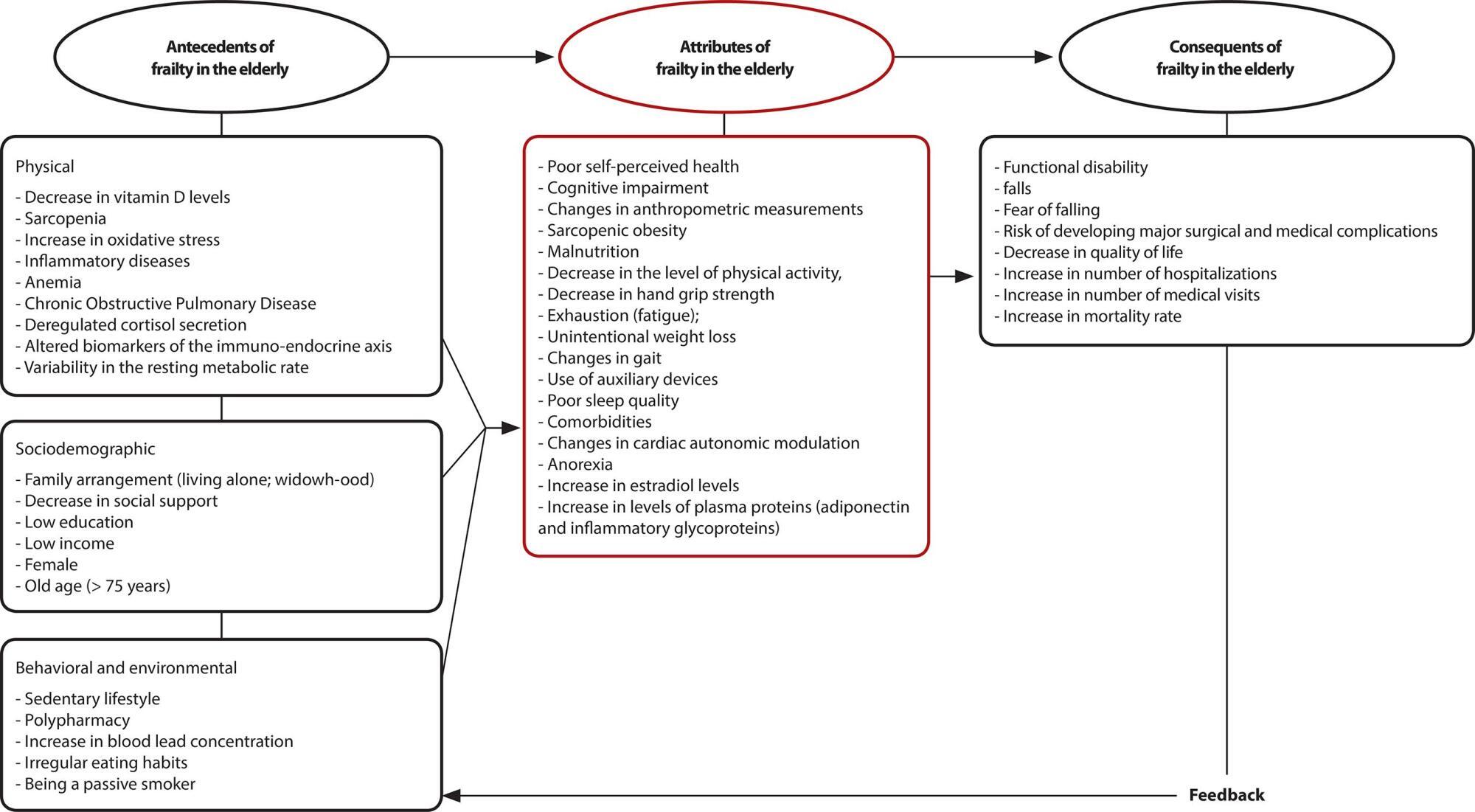
-
ORIGINAL ARTICLE09-16-2019
Tuberculosis: health care and surveillance in prisons
Revista Brasileira de Enfermagem. 2019;72(5):1304-1310
Abstract
ORIGINAL ARTICLETuberculosis: health care and surveillance in prisons
Revista Brasileira de Enfermagem. 2019;72(5):1304-1310
DOI 10.1590/0034-7167-2018-0260
Views0See moreABSTRACT
Objective:
To identify tuberculosis-related health care and surveillance actions in Prison Health Units.
Method:
Cross-sectional study, of quantitative, exploratory and descriptive character. We visited 13 Teams of Prison Health, and nurses and technicians were interviewed regarding epidemiological surveillance instruments, physical structure and materials.
Results:
Search for respiratory symptoms in admission was reported by 6 (46.2%) of the teams, and the smear microscopy was the most requested test. The Logbook of Respiratory Symptoms and the Logbook for Monitoring Tuberculosis Cases were used in 7 (53.8%) institutions. Two of them (15.4%) had a location for sputum collection and 1 (7.7%) had a radiographer. The Directly Observed Therapy was reported in 7 (53.8%) units.
Conclusion:
Health care actions related to the search for respiratory symptoms and Directly Observed Therapy should be expanded, as well as surveillance actions and recording in official documents of the National Tuberculosis Control Program.
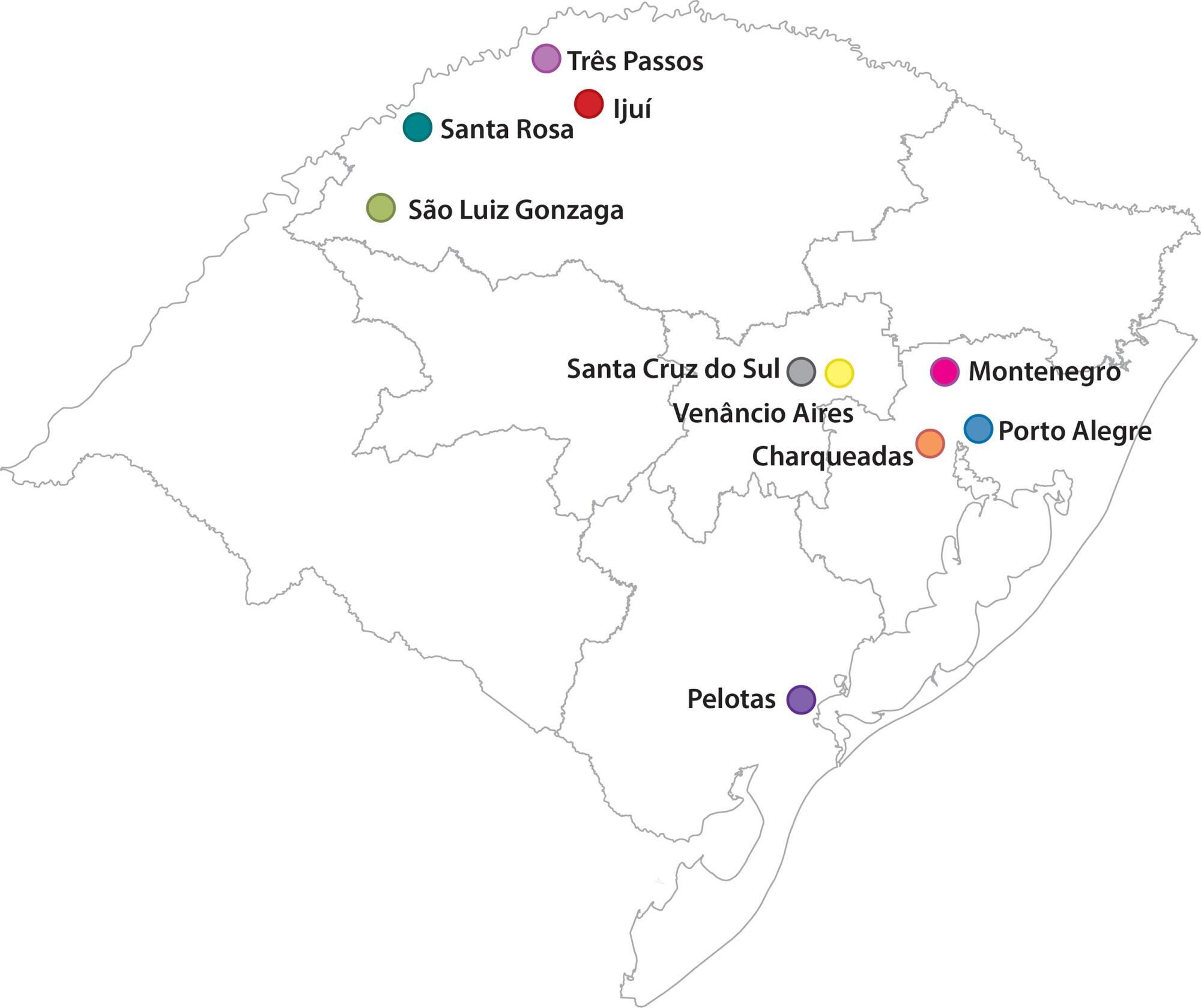
-
04-14-2021
COVID-19 patients in prone position: validation of instructional materials for pressure injury prevention
Revista Brasileira de Enfermagem. 2021;74:e20201185
Abstract
COVID-19 patients in prone position: validation of instructional materials for pressure injury prevention
Revista Brasileira de Enfermagem. 2021;74:e20201185
DOI 10.1590/0034-7167-2020-1185
Views0See moreABSTRACT
Objective:
to perform the content and face validation of a checklist and a banner on pressure injury prevention in patients in prone position.
Method:
this is a methodological study of content and face validation with 26 nurses with specialization. Professionals assessed the checklist and the banner in relation to clarity, theoretical relevance, practical relevance, relation of the figures to the text and font size. The Content Validity Index was calculated for each item, considering one with a value equal to or greater than 0.8 as valid.
Results:
all the actions described in the checklist and in the banner had a Content Validity Index greater than 0.80, with standardization of verbal time and esthetic adjustments in the banner’s layout, as suggested.
Conclusions:
the checklist and the banner were validated and can be used in clinical practice to facilitate pressure injury preventions in patients in prone position.
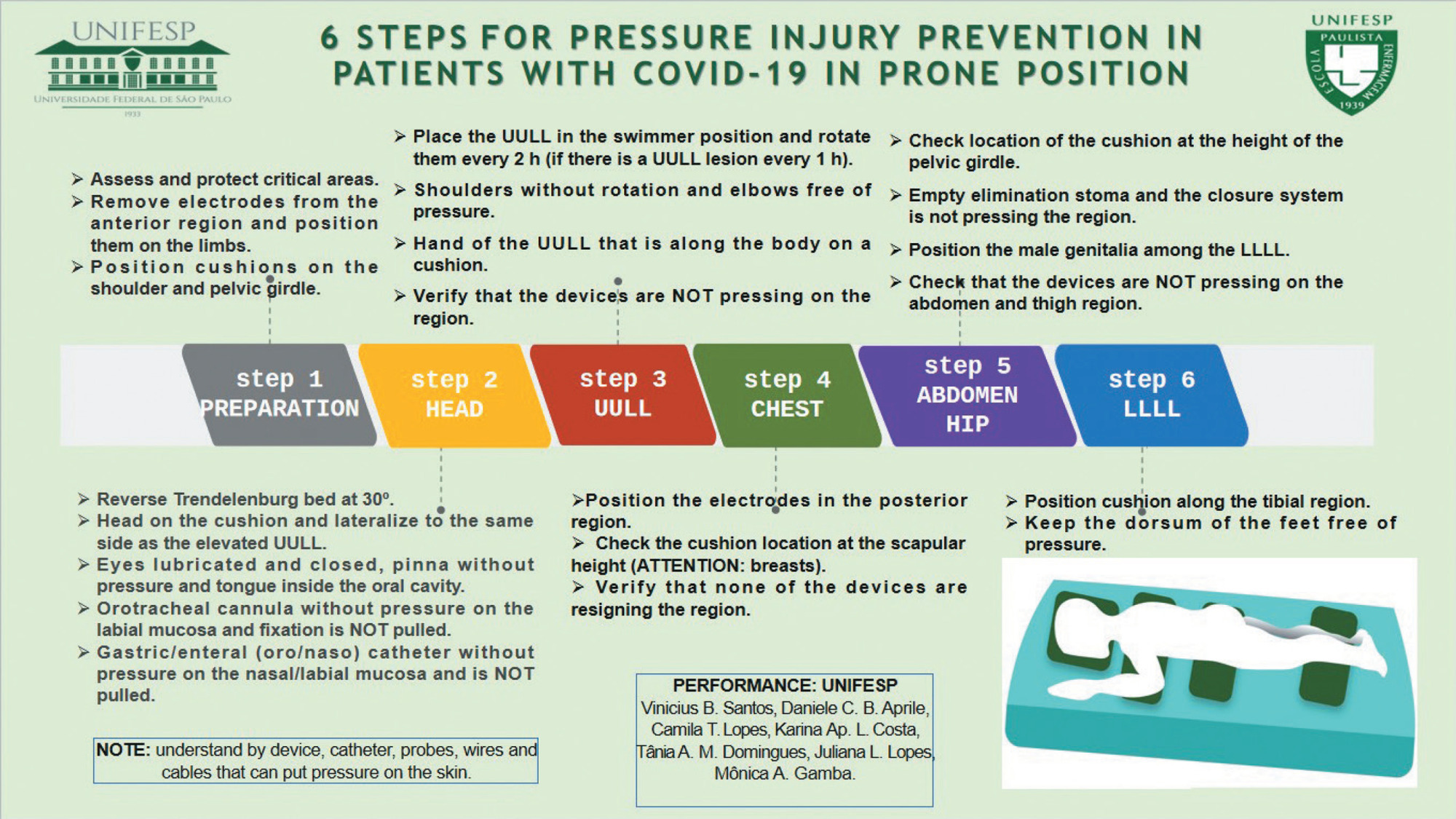
-
02-10-2020
Development of middle-range theories in nursing
Revista Brasileira de Enfermagem. 2020;73(1):e20170893
Abstract
Development of middle-range theories in nursing
Revista Brasileira de Enfermagem. 2020;73(1):e20170893
DOI 10.1590/0034-7167-2017-0893
Views0See moreABSTRACT
Objective:
To identify in the literature how Middle-Range Theories (MRT) are being developed in Nursing.
Method:
Integrative review on the databases Lilacs (Latin American and Caribbean Literature in Health Sciences), Scopus, Cinahl (Cumulative Index to Nursing and Allied Health Literature), Web of Science and PubMed portal, using the keywords middle range theory and nursing, as well its Portuguese correspondents (Lilacs), and the Boolean operator AND. The sample included 25 articles.
Results:
All articles presented concepts related to MRT. Most developed a synthesis picture. Some theories have formulated specific propositions, hypotheses, and names. Only 16 articles cited the methodological framework, while 22 used theories or models for theoretical foundation and 11 carried out literature reviews.
Final considerations:
The development of MRT included the presentation of fundamental concepts, synthesis, propositions, hypotheses and specific name. The MRT is recognized as a way of developing knowledge to guide the nursing practice.
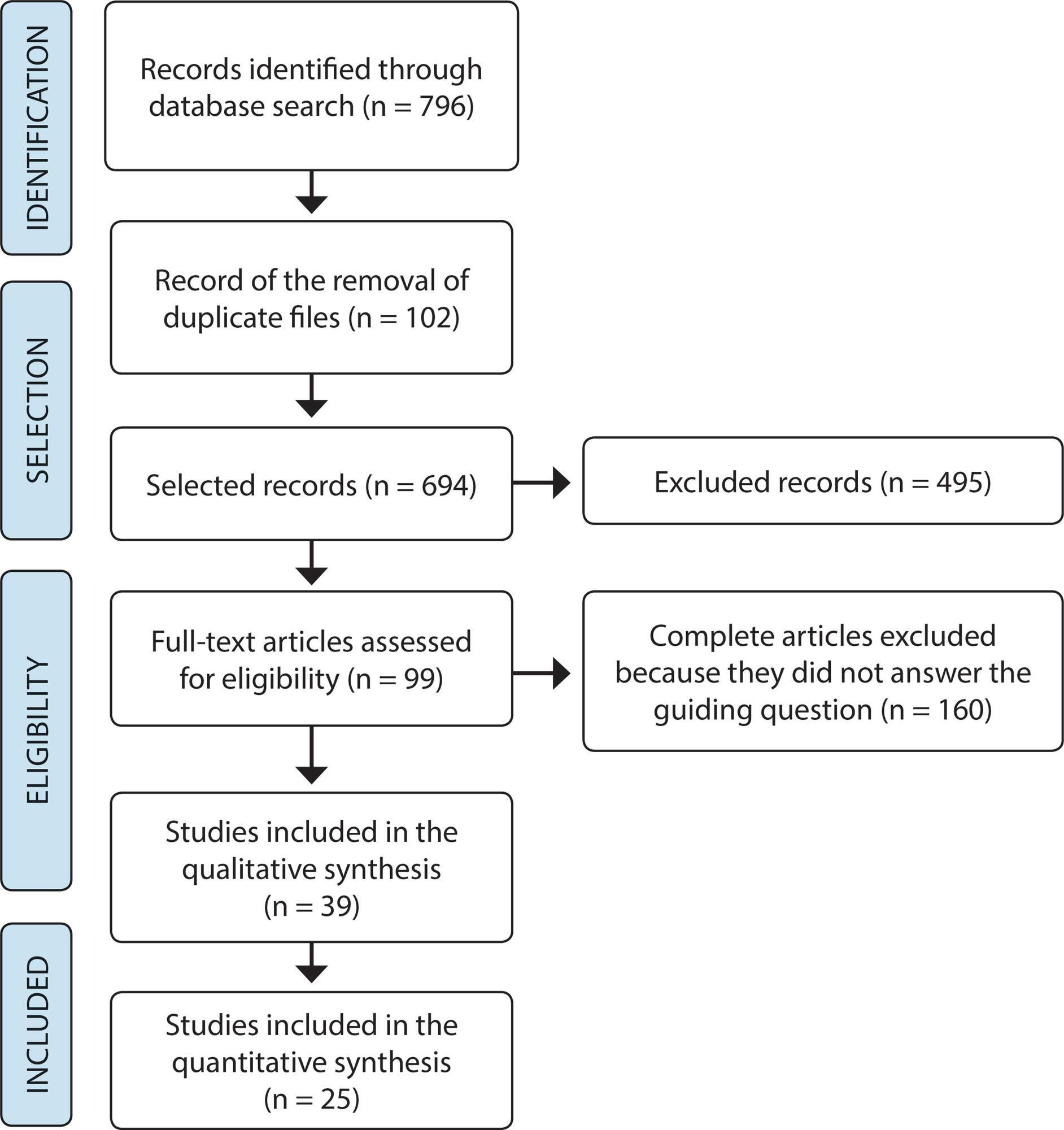
-
09-16-2019
Construct validation: coping with HIV/AIDS in Primary Health Care
Revista Brasileira de Enfermagem. 2019;72(5):1173-1181
Abstract
Construct validation: coping with HIV/AIDS in Primary Health Care
Revista Brasileira de Enfermagem. 2019;72(5):1173-1181
DOI 10.1590/0034-7167-2018-0734
Views0See moreABSTRACT
Objective:
To validate the construct and measure the trustworthiness of a questionnaire aimed at assessing HIV/AIDS coping actions developed by health professionals in Primary Health Care.
Method:
A methodological study carried out with 397 primary health care professionals in two municipalities in the Northeast region of Brazil. The construct validity was developed by the exploratory and confirmatory factor analysis, and the reliability analyzed by the reliability and reproducibility.
Results:
The validation determined six factors retention that composed the six domains of the questionnaire. Internal consistency was 0.91 and quality of the confirmatory analysis adjustment was 0.998 for Goodness of Fit Index. The domains presented Kappa values between 0.833 and 0.997.
Conclusions:
The final questionnaire was composed of 18 items and presented feasibility of application, and potential to evaluate actions for HIV/AIDS control in Primary Health Care.
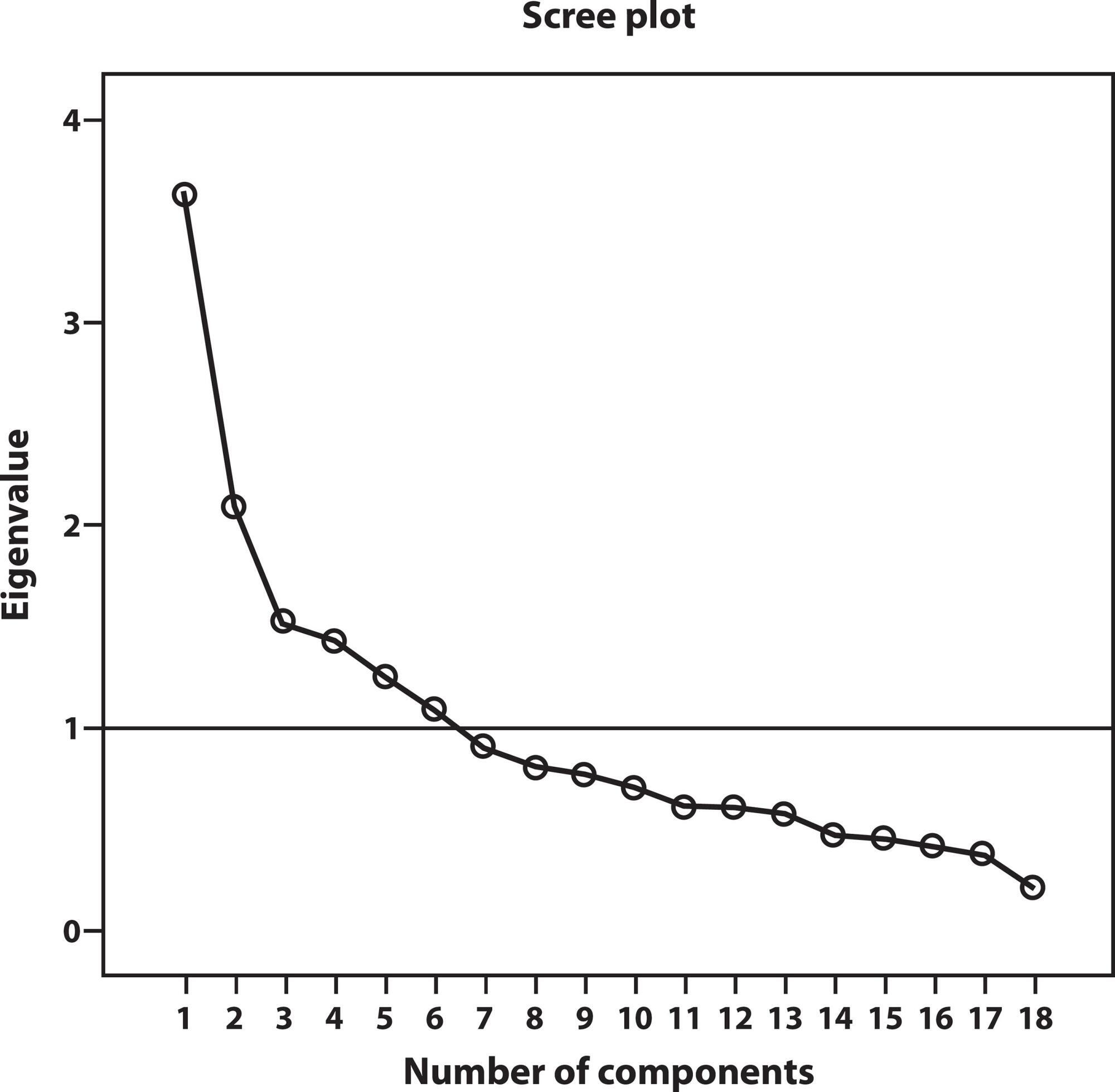
-
ORIGINAL ARTICLE02-10-2020
Stress and health risk behaviors among university students
Revista Brasileira de Enfermagem. 2020;73(1):e20180035
Abstract
ORIGINAL ARTICLEStress and health risk behaviors among university students
Revista Brasileira de Enfermagem. 2020;73(1):e20180035
DOI 10.1590/0034-7167-2018-0035
Views0See moreABSTRACT
Objective:
To analyze the level of stress and its relationship with health risk behaviors among university students.
Method:
Cross-sectional analytical study carried out at a higher education institution in Picos-PI. A total of 377 students were evaluated for socio-demographic and academic variables, stress profile, sleep quality, alcohol use, smoking habits and level of physical activity. The Statistical Package for the Social Sciences (SPSS), version 20.0 was used for data processing and analysis.
Results:
Sleep quality was poor for 65.3% of the subjects, and sleep disturbances were found in 17.0%. Stress was observed in 68.7% of the sample. Stress was associated with the following variables: gender, time in the institution, poor sleep quality.
Conclusion:
Most of the students evaluated present some level of stress associated with poor sleep quality, which is a risk to the quality of life of these individuals.
-
ORIGINAL ARTICLE03-24-2021
Self-care of people with intestinal ostomy: beyond the procedural towards rehabilitation
Revista Brasileira de Enfermagem. 2021;74(1):e20200088
Abstract
ORIGINAL ARTICLESelf-care of people with intestinal ostomy: beyond the procedural towards rehabilitation
Revista Brasileira de Enfermagem. 2021;74(1):e20200088
DOI 10.1590/0034-7167-2020-0088
Views0See moreABSTRACT
Objectives:
to interpret the self-care experience of people with intestinal ostomy registered in an ostomy program, based on the framework of the Social Model of Disability.
Methods:
qualitative exploratory research, with the participation of nine people with intestinal ostomy, based on the Social Model of Disability.
Results:
majority were elderly, married, male with colostomy due to colorectal neoplasia. The self-care of these people was analyzed in two thematic groups: “Interdisciplinary assistance needed for people with intestinal ostomy” and “Self-care for the rehabilitation of the person with intestinal ostomy”. It was proved that there was a need for a specialized health team, offering information on disabilities, teaching self-care and perioperative follow-up.
Final Considerations:
when the social barriers of physical disabilities are overcome in the context of assistance for health and life, self-care will go beyond the reductionist vision of procedural care, towards comprehensive care, favoring the achievement of rehabilitation and the quality of survival.
-
03-19-2021
Production and validation of educational technology on nursing care for syphilis prevention
Revista Brasileira de Enfermagem. 2021;74:e20190694
Abstract
Production and validation of educational technology on nursing care for syphilis prevention
Revista Brasileira de Enfermagem. 2021;74:e20190694
DOI 10.1590/0034-7167-2019-0694
Views0See moreABSTRACT
Objectives:
Validate script and storyboard of a video for educational intervention on nursing care for the prevention and management of syphilis.
Methods:
Methodological design study, with quantitative analysis approach. The content and appearance of the educational video script and storyboard was validated by a committee of experts on the subject and video. They were considered validated from the agreement of 78%, calculated by means of the Content Validity Index.
Results:
There were suggestions, which were analyzed; and, where relevant, the script and storyboard were changed. The degree of agreement among the expert judges on the subject obtained a Content Validity Index (CVI) of 100%, while, with the technical experts in video, all the questions in the educational material obtained the percentage above the recommended minimum of 78%.
Conclusion:
The validated video is an important technological production and could be used in the context of health care.
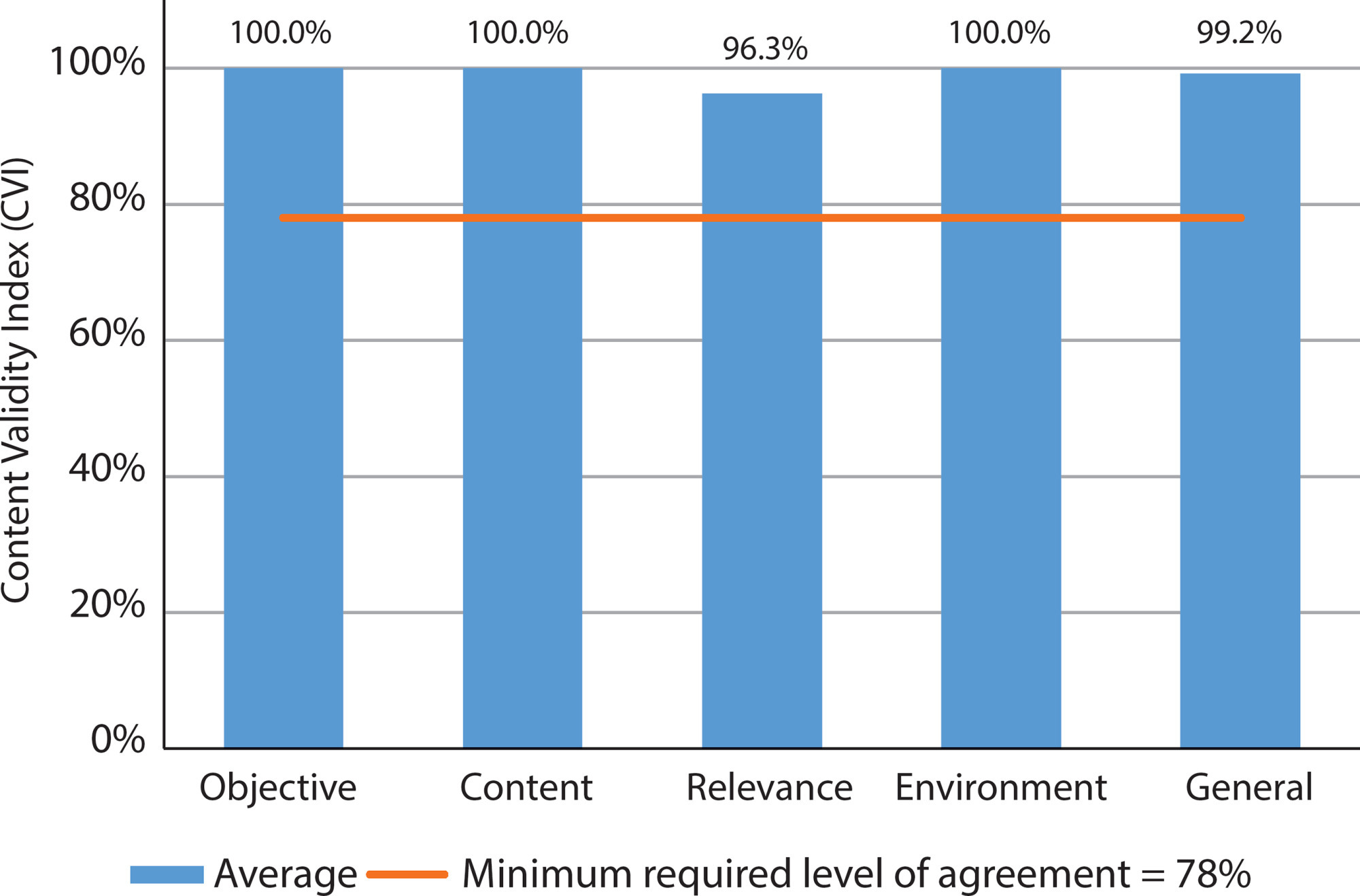
Search
Search in:
Nuvem de Tags
Adolescente (85) Atenção Primária à Saúde (239) COVID-19 (91) Criança (91) Cuidados de Enfermagem (269) Educação em Enfermagem (151) Educação em Saúde (139) Enfermagem (930) Enfermagem Pediátrica (86) Estudantes de Enfermagem (77) Estudos de Validação (131) Família (87) Idoso (208) Promoção da Saúde (99) Qualidade de Vida (104) Saúde do Trabalhador (86) Saúde Mental (145) Saúde Pública (82) Segurança do Paciente (150) Tecnologia Educacional (100)



